Peter MALONE
Agatha Christie's Poirot Death in the Clouds
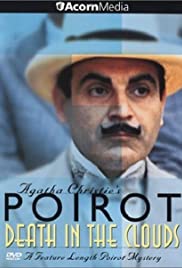
DEATH IN THE CLOUDS
UK, 1992, 103 minutes, Colour.
David Suchet, Philip Jackson, Sarah Woodward, Shaun Scott, Cathryn Harrison, David Firth, Amanda Royle, Richard Ireson, Jenny Downham, Eve Pearce, Roger Heathcote, Guy Manning, Gabrielle Lord, John Bleasedale..
Directed by Stephen Whittaker.
Death in the Clouds is one of the earliest of the 23-year, 80 film series on television with David Suchet as Poirot. While there are some sequences in England, most of the action takes place in Paris, attractively photographed, sets and decor of the mid 1930s, glimpses of Montmartre, the Eiffel Tower, art galleries, the streets – and a tennis match at Roland Garros featuring the English champion Fred Perry.
The action sets the tone for a murder – although Cathryn Harrison as Lady Horbury, extraordinarily haughty and objectionable, seems a good candidate for murder. She is unfaithful to her husband, taking up with an actor whom she bosses, in debt to a local woman for a considerable amount of money, Gisele. And, the death in the clouds in the plane journey from Paris to London is Gisele.
Chief Inspector Japp comes to Paris, Philip Jackson having more screen time because Captain Hastings is not present in this film. He is amusing as he takes over the French Inspector’s office and phone. And there are some jokes about his British taste for food. He works with Poirot, critical of the French, Poirot pointing out some effective detecting.
On the plane journey from Paris, Poirot sleeps, trying to avoid his anxiety. Later, he tests out his theories, with a blowpipe, on an unsuspecting passenger group.
Sarah Woodward as Jane Gray, the flight stewardess, takes the place of Captain Hastings and helps Poirot in his investigations, taking him to the tennis, falling in love with a charming dentist.
Eventually, Poirot gathers everyone together, as always, and what seems to be an insoluble case, as explained, especially using the list of the contents of the passengers’ cases and the murdered woman having two spoons with her cup of coffee.
1. The popularity of Agatha Christie mysteries? The television series? With David Suchet as Poirot? This film as one of the earliest of the full-length features?
2. The French settings, Montmartre, the Eiffel Tower, Art Gallery, the streets, the hotels, Roland Garros? Sets and decor and the feel of the period? The musical score?
3. Poirot in Paris, his not liking Montmartre, the conversation with Jane Gray, the encounter at the Art Gallery, his explanation of surrealism? The invitation to the tennis? His politeness, observing the characters, especially Lady Horbury? At the hotel, her insulting him as a Frenchman? His observations of her interactions with Gisele?
4. Lady Horbury, haughty attitudes, snobbery, looking down on the French? The strained relationship with her husband? The board and tennis? Her comments on his friendship with Venetia? The story about her relationship with the actor? Talking with Gisele, visiting the apartment, the audience not hearing what she said? Elise observing?
5. Jane Gray, charming, the encounters with Poirot, meeting Norman Gale? The tennis? His taking her out? Her work as a flight attendant?
6. Lady Horbury, Venetia, on the plane, the demanding attitudes, her maid and Poirot seeing her at the hotel? On the plane? The discovery of the Gisele was on the plane? Norman Gale and the pleasant conversations with Jane?
7. The other passengers, Dupont and his father’s explorations in Africa? Daniel Clancy and his absentmindedness, mystery writer, speaking about his character determining what he wrote?
8. The steward, Jane, their work throughout the flight? Poirot sleeping?
9. The discovery of Gisele dead, Norman with his dentist background offering to help, the experience of the wasp, Dupont killing it? The red herring about the South American pipes, the discovery in Clancy’s room, his research and not writing the novel? The wound in Gisele’s neck?
10. The police, the interrogations, Lady Horbury and her demands, to get on the plane? The examination of the contents and the listings – important of that information to the solution of the case?
11. Chief Inspector Japp arriving, his having more time on screen in this film? Taking over the French police office and phone? Very British – and his food? The interrogations, on the plane, Poirot series? Finding where the pipe was bought? The loud American – and the actor?
12. Poirot asking Jane to help him, getting information, accompanying him? And the time with Norman? Norman impersonating the journalist and confronting Lady Horbury and the actor?
13. Lady Horbury disappearing, her husband coming to talk with Poirot? In Paris, at the casino, her gambling, her losses? The newspaper and the photo? Poirot accosting her, the conversation at the cafe?
14. Dupont, asking Jane who Poirot was, wanting to ask him for a donation for his exhibition?
15. The interrogation of the steward, the information about the two spoons?
16. Gisele’s daughter, the French police, her visit, the story of her marriage, her being found dead on the train? Her mother disowning her, her going to Canada, returning to England, taking a place as a maid for lady Horbury, marrying Norman, his murdering her for the money?
17. Norman’s plan, Poirot gathering everyone together, everybody’s responsibility, the pipe in Poirot’s seat (and the comedy of testing this out with unsuspecting passengers)? Norman as dentist, his white coat, his disguise, to the toilet, the wasp and the empty matchbox, taking the teaspoon, killing Gisele so that her daughter would inherit?
18. Jane, her sadness, Poirot reassuring her that Norman loved her in fact? And the finale with Japp for a French meal with Poirot?
Hater, The
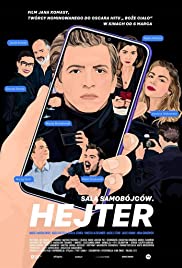
THE HATER
Poland, 2020, 136 minutes, Colour.
Maciej Musialowski, Vanessa Aleksander, Danuta Stenka, Jacek Koman, Maciej Stuhr, Adam Grabowsky.
Directed by Jan Komasa.
The Hater was released in cinemas in Poland just before the coronavirus outbreak and was almost immediately moved to streaming release, seen on Netflix throughout the world.
The director, Jan Komasa, had previously made the arresting film, Corpus Christi, about a young man who was released from a detention centre to work in a mill – but disguises himself as a priest and takes the place of the parish priest, ingratiating himself with the congregation.
This film is also about a disturbed young man, Tomasz, played effectively and puzzlingly by Maciej Musialowski. In the first moments of the film, he presents himself as a victim, accused of plagiarism but defending himself to the professors but then expelled from the University. It emerges that he is a pathological liar, mental difficulties in the past, and with his family.
The film follows his quest to find himself a substantial job, a place in society, money and comfort. He ingratiates himself with an affluent family who lend him money for his studies, and has a brief relationship with their younger daughter. He applies for many jobs but finally succeeds with a very dubious company which is hired by anonymous clients, investigates targets, especially political, here a mayoral candidate for Warsaw. There is surveillance, creation of stories, fake news, undermining of campaigns.
Tomasz ingratiates himself with the target candidate, who is supported by the family, and makes a favourable impression with the candidate himself, only to set up the candidate, about whom there are gay rumours, spiking is drink, persuading him to go into a gay club, film him. However, he also persuades the candidate to stay in the race and he apologises to his staff.
Audiences have to pay attention to some of the detail and may miss various steps in the development of the plot, especially Tomasz and his playing computer games and linking himself with a mentally disturbed gamer and primes in to violence against the candidate.
Because he looks somewhat innocent and people believe in him, Tomasz is able to persuade most people that he is authentic – but, not only is he a pathological liar but he is a destroyer, an anarchist, with ambitions only for himself.
In an age of fake news, of cyber attacks, of ruining reputations, this is a story that is alerting and topical.
1. Title? Expectations? Atmosphere of hate? In contemporary Poland, Warsaw, politics, culture, mores?
2. The Polish setting, the end of the 2010s, the background of the Communist legacy, changes at the end of the 20th century? Greater freedoms? Yet repressions? Rise of fascism?
3. The story of Tomasz, his age, the background of his family, the mystery about his mother, mental problems in the family? His plagiarism, the interview with the professors, his expulsion, exploiting the professor with her autograph in his book? His look of innocence, his tear? The truth, his being a pathological liar?
4. His visiting the family, his story about his studies and work, their financial support, the relationship in the past? The parents, affluence, political connections, the support of the mayoral candidate? Their daughter in England studying? Gabi, held up by the demonstrations, at the meal, the attraction to Tomasz? His leaving his phone, recording the conversation, the adverse comments?
5. Going with Gabi to the club, the dancing, the drugs? The young woman, the rental for the apartment? Setting himself up? His job applications? Promoting himself? Going to the company, the encounter with Beata, her harsh manner, the interview, her seeing through him, her assistant, Kamil, giving him the month’s testing, his work and diligence?
6. Beata, strong, exploitative moral stances, anonymous clients, subversive activity, no holds barred, surveillance, phone tapping, fake news, looking for scandals? The revelation that the client was the conservative mayoral candidate? Tomasz visiting his home, his daughter, asking for the money, the thug driving him and bashing him? The target for the company, the alternate mayoral candidate, Tomasz and his idea of infiltrating the campaign, the support of the friendly family, their appreciating him, his helping with the drinks at the art auction? Getting high with Gabi? Gaining confidence?
7. The audience trying to assess Tomasz, what he believed in, any moral scruple? His lies? Political adherence?
8. Ingratiating himself with Pavel, the gay rumours, talking straight to Pavel, his being employed, his being believed? His plans, the dinner date, spiking the drink, taking into the gay club, the dancing, his losing control, the photos? Pavel with the staff, the apology, Tomasz urging him on, the continued campaign?
9. The musical score, the backgrounds, operatic, the concerts, the opera performance and the violinists, and the intercutting of dramatic incidents with the music?
10. Social media, Tomasz and his phone, the messages, with Gabi, recording conversations?
11. The political demonstration, the police, the violence, the family and the death of their daughter?
12. His ingratiating himself with Beata, the drinks, the walk, going home, the sexual encounter, her son and the photos? His returning at the end, with his file and his hold over her? Her acceptance, the new mission? And his getting rid of Kamil?
13. The computer games, the avatars, the combats, the contact with Guzek, the games, confrontations, the demand for money, the story about the ill mother? Controlling Guzek for the attack?
14. The raid on the arms store, killing the guard, the rendezvous and Guzek picking up the arms?
15. The buildup to the social, the family, can be returning from the US, the concert, Gu thezek entering, firing, fears and panic, the deaths, confronting Pavel, shooting him? Tomasz and his confrontation with Guzek, being stabbed, considered a hero?
16. In hospital, the visit of the security police, the interview, Tomasz and his indignation?
17. Visiting the family, their sadness – and the camera outside the window and ascending? The question of Tomasz and his future?
I Kill Giants
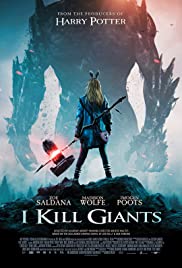
I KILL GIANTS
US, 2017, 106 minutes, Colour.
Madison Wolfe, Zoe Saldana, Imogen Poots, Sydney Wade, Rory Jackson, Jennifer Ehle, Don Wycherley, Noel Clarke.
Directed by Anders Walter.
I Kill Giants may be an offputting title for prospective audiences. It is based on a Man of Action graphic novel by Joe Kelly who has adapted it for the screen.
The focus is on a young girl, Barbara, played by Madison Wolfe. There are difficulties in her family, her dying mother, Jennifer Ehle, her sister, Karen, played by Imogen Poots. At school she is very dogmatic, offputting to the other students. However, one of the teachers, therapist, played by Zoe Saldana, tries to work with her.
Barbara lives in a fantasy world, a world menaced by giants, symbols of evil. The film uses special effects to re-create this world, especially on the coast, on the beaches, storms at sea.
An unusual story, with an effect on children who identify with Barbara or understand her fantasies, with an effect for parents concerned about imaginative children.
1. The title? Tone? The introduction of themes?
2. The film as a fable, magic, myths, symbols, hate and destruction? The war against such giants?
3. The American setting, the town, homes, the school, offices? The coast and the beaches? The storms?
4. The impact of the special effects to create the fantasy?
5. The credibility of the plot, audiences surrendering to this fantasy, getting inside Barbara’s mind?
6. Barbara, her mother, ill, Karen and her support, the life of the family? Barbara and reality, refusing reality?
7. The imaginative world, the giants and their effects, the threats, the storms, the sea? The personification of threatened terror?
8. Mrs Molle, her role, persuasion, care? At the school? Therapy? The school and the authorities?
9. The other children, Barbara and her relationship with them, taunting her?
10. Barbara as dogmatic, demanding, the effect on others, always right, off-putting?
11. Mrs Molle and her sessions, her husband, talking with Barbara, Barbara’s response, the breakthrough?
12. The climax, fear, dangers?
13. The ultimate effect on Barbara, on her family, on the community?
Kid Like Jake, A
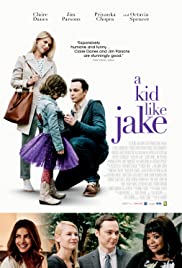
A KID LIKE JAKE
US, 2018, 93 minutes, Colour.
Clare Danes, Jim Parsons, Octavia Spencer, Pryanka Chopra, Ann Dowd, Amy Landecker, Leo James Davis.
Directed by Silas Howard.
A Kid Like Jake is based on a play by Daniel Pearle. And, at times, it is very much based on the play, some very strong dialogue sequences, especially between a husband and wife, played by Claire Danes and Jim Parsons, Buxton Greg, who are concerned about their four-year-old son, Jake, and the possibilities about his schooling. This from intense discussions, there is a great deal of anger and confrontation. The dialogue from the play is also very strong in sequences where Greg, a psychologist, is dealing with a client. And there are quite a number of conversations with educator, Judy, played by Octavia Spencer.
The basic thrust of the film concerns gender identification. Jake is four. His behaviour is much more like that of the stereotypical girl. He likes to dress up. He is highly imaginative in his storytelling. He identifies very strongly with princesses in fairy stories. Can the parents recognise this, can they acknowledge it, what is it mean for Jake’s education, his interactions with children his own age?
The film has a strong supporting cast with Ann Dowd as Alex’s mother, with Amy Landdecker as the client.
This is a dramatic contribution to the many documentaries concerning gender and transgender.
1. The title? The focus on a young boy? Family upbringing? Kindergarten? Discipline issues? Personality? Gender? The impact on parents? Teachers?
2. The American city, comfortable homes, schools and kindergartens, psychology practice, law firms? Restaurants? Parks? Education interviews? The musical score?
3. The film’s focus on the parents rather than on the child, Jake not being a strong presence in the film visually, seen at play, tantrums, dressing up, with the other children, the party? But seen through the perspective of the parents and their discovering his nature?
4. Alex and Greg, their marriage, love for each other, scenes at home, intimacy, Alex as the strong character, giving up her law work, her interactions with her demanding mother, a range of friends? Greg, seen it work, the discussions with his client, the noise from the adjoining office? Not as imposing a character as Alex?
5. Judy, friend, her work with children, sharing with Alex? Taking care of Jake? Her observing of his character, his talents, the feminine side? Advice to the parents, their interest in school applications, her help? The confrontation where she tried to tell them the truth, Alex and her anger, taunting her about not having children, Greg and his silence? The later reconciliation and conversations? At Judy’s house, her partner?
6. Greg, at work, listening, Sandra, her being a client, taciturn, waiting, bursting out, wanting something from Greg, his saying she was a planner? The revelation about IVF, the attempts, the effect on her, on her husband, giving up the attempts, at the restaurant, his saying that they were done, her relief? The divorce documents? Greg listening to her in the light of his own experiences of marriage?
7. The meeting with Judy, Alex and her increasing anger, outburst, attacking Judy, leaving, the hospital and miscarriage? Her anger, returning home, treatment of Greg, his reactions, the power of the dialogue, eventual reconciliation?
8. Jake, four, place in the home, the feminine tendencies, dressing up, imagination, the Princess stories, identifying with them? His birthday party and the criticisms? His finally walking up the street and the dress, with his parents?
9. The range of teachers, the kindergarten? Alex and Greg and their friends, the dinner, the discussions? The other teachers and their help?
10. The importance of education, schools, possibilities, development, preparing essays, interviews?
11. The impact for the average audience on issues of gender, physical and psychological, transgender issues, especially any young boy? The impact for the parents and coping? Affirming him? His future?
Okja
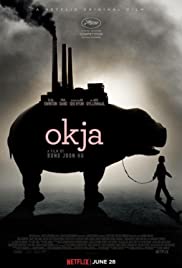
OKJA
South Korea, 2017, 120 minutes, Colour.
Ahn Seo-yun, Tilda Swinton, Paul Dano, Lily Collins, Shirley Henderson, Daniel Henshall, Devon Bostick, Giancarlo Esposito, Jack Gyllenhaal.
Directed by Bong Joon-ho.
Bong Joon-ho made an impression with a typical Korean crime drama, Memories of Murder. However, during the 2010s, he branched out quite imaginatively (blend of realism and surrealism) with the science fiction film The Host, with the futuristic parable, Snowpiercer (later to be a significant series for Netflix). In early 2020, he became quite world-famous with his film-parody-satire, Parasite, being successful at the Academy Awards, Best Foreign Language Film and capping everything, the Oscar for Best Film.
Okja is definitely a blend of real and surreal. In fact, the title of the film is the name of a super-pig, fostered in South Korea by a young girl, Mija (Ahn Sen-yun) and her family. A scout for an American company (Jake Gyllenhaal) wants to transport the pig to the United States, scouting for a company headed by Tilda Swinton (who plays twins). To try to prevent this, and Animal Liberation Front tries to stop the action in Korea and, when the girl and her pig arrive in the United States, deals done, a huge public parade to promote the industry, the Front intervenes and disrupts.
There is commercial ruthlessness. There are scenes and a slaughterhouse. The Animal Liberation Front is active again despite some of its own interior struggles. Okja, almost dead, is rescued and goes back so home with Mija. (And a post-credits sequence indicating the possibilities for a sequel, jailing of key ALF personnel, especially Jay (Paul Dano), and future activity and disruption.
1. Science fiction? Science fantasy? Real? Surreal?
2. The work of the director, his imagination, offbeat portraits of human nature?
3. The title, the focus on the super-pig? The Korean settings? The farm? Corporations? Cities? Transition to the United States? Corporations, farms, industrial plant? The musical score?
4. The credibility of the setting, South Korea, the farm, Mija, her age, her love for her pig, the support of the family, her character, her life? About to change?
5. The visit from the American representative, to take the pig to the United States, the forming of the gold pig as compensation? The transport of the pig from the farm?
6. Mija, the effect on her, her following the pig? The experience of the Animal Liberation Front, the aims, the personalities, Jay and Kay, motivations, pro-animals, Kay and his deception? The recording in the year, translation for Mija? The falling out between the two? Finding reconciliation?
7. The Mirando company, Nancy and Lucy, Lucy taking over, her appearance, manner, domination? Ambitions? Nancy's final assertion?
8. The super-pig in the United States? Reactions? Testing the flesh, commercialisation of the pig? Going to the abattoir?
9. Public relations, and the parade, the demonstration, the pig on display, the interruption of the parade, the expose?
10. The intervention of the AFL, the various personalities, helping Mija?
11. The intervention of the authorities? Ruthless?
12. The pig, the birth of the piglet, concealing it? And the returned to Korea?
13. The post-credits sequence? Prison, release, AFL plans?
Dog Eats Dog
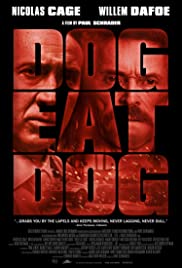
DOG EAT DOG
US, 2016, 93 minutes, Colour.
Nicolas Cage, Willem Dafoe, Christopher Matthew Cook, Omar J. Dorsey, Paul Schrader.
Directed by Paul Schrader.
Dog Eats Dog comes 40 years into Paul Schrader’s significant but mixed career of writing and directing films. In the 1970s and 1980s, he was a significant figure, especially in his collaborations with Martin Scorsese, Taxi Driver, Raging Bull, Last Temptation of Christ. He also made his mark in directing significant films starting with Blue Collar, Hardcore and continuing throughout the decades with some strong films and also some strange minor choices.
The focus of this story about criminals getting out of prison, having two strikes against them and fearing life imprisonment because of the third strike rule, they gather together, share their hopes, looking for the perfect crime to make their lives secure.
A lot of the film spends time on focusing on each of the characters, Nicolas Cage and his film obsession, the planner, yet potential for erupting. Willem Dafoe is Mad Dog, intrinsic explosive. The contrast is with Christopher Matthew Cook as Diesel, quiet and large.
Schrader himself appears as a gang Lord commissioning the three to kidnap the child of a rival.
The plan is made. The crime is to be carried out – with so much going wrong.
In the end, probably just a film for those who wish to be completers concerning Paul Schrader’s career.
1. The title? Expectations? Human nature? Animal nature? Violence?
2. The work of Paul Schrader? His writing? Directing? Strong themes over many decades? The place of this film in his career? And the critical comment? Not popular? For his fans?
3. The Los Angeles setting, sleazy, the strip clubs and those in them, the drinking, drug background, sexuality? The background of gangs and gang leaders? Mafia types? Gang rivalries?
4. The prison background, harsh, the three men and their experiences? Two strikes? Getting out, their ambitions, the crime that will make them? And yet to avoid the three strikes rule?
5. Nicolas Cage, Troy, his prison experience, his film references, to Elvis, admiration for Humphrey Bogart, film noir? Getting out, the final crime, the plan?
6. Willem Dafoe: Mad Dog, personality, violent, past experiences, sleazy, unlikable?
7. Diesel, prison experience, being, quiet, part of the group?
8. The early part of the film, the three men, the conversations, going on for a long time, revealing their characters?
9. El Grecco, his position in Los Angeles, gang rivalries, the proposal for the crime? The kidnapping of the child?
10. The planning, police, disguise, the execution of the crime, things going wrong?
11. The role of the police, Troy and his bashing the woman? The greater violence?
12. The mismanagement? Building up to a culmination? Diesel and his hunger? Violence and death?
13. Schrader’s interpretation of human nature in the context of prison and crime? The worst aspects of human nature?
Replicas
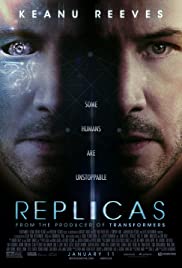
REPLICAS
US, 2018, 107 minutes.
Keanu Reeves, Alice Eve, Thomas Middleditch, John Ortiz.
Directed by Jeffrey Nachmanoff
Replicas is a piece of futuristic science-fiction. In Puerto Rico, there is a laboratory where scientists are experimenting on those who have recently died, wanting to preserve their brain life, transferring it to a mechanical framework, a robot. Chief scientist is William, Keanu Reeves, assisted by an earnest Thomas Middleditch. John Ortiz is the sinister boss of the Institute, more interested in finance than in scientific advance.
William succeeds with a brain transplant of an American soldier who then goes berserk. The complication of the film’s plot is that William and his wife, Alice Eve, and three children are in Puerto Rico. They are involved in a car accident, wife and children all dying. But, there are only three robotic cases and William decides to let his youngest daughter, to whom is devoted, remain dead, removing memory traces of her from the others. While the brain transplant is not successful, the scientists realise that they can actually transfer bodies so that the resuscitated wife and children become perfect copies.
As expected, not everything will go well, the boss intervening and wanting the logarithms for himself. However, there is a happy ending for the family, the revival of the youngest daughter and a reunion. And, the boss is shot but also revives to open his own clinic for wealthy clients and their future lives.
1. The title? Science-fiction? A variation on the Dr Frankenstein story? Science, hubris, mistakes?
2. The Puerto Rico setting? The tropics? William and his home, the family? The scientific centre, the elaborate interiors, laboratories, machines, technology? The musical score?
3. William, his reputation, the experiments, with the dead, the robotic body, the algorithms, the visuals of the algorithms, bringing the dead to life, the dead soldier, his violent reaction?
4. Ed, science, loyal to William, participating in the techniques and experiments? The contrast with Jones, the boss, money, the threats to William and his future?
5. William, his wife and children, devotion to his wife, to his little girl, domestic scenes, her drawing on the table (and his later scrubbing it out)? Going for the drive? The accident? Deaths?
6. William and his decision, taking the bodies, covering all the possibilities for where his family was, school…? Wanting Ed to participate in the experiment? Reluctance, caution, persuaded?
7. The experiments, transferring the brain? The breakthrough, the family alive in their bodies? Bringing the bodies to life? The success?
8. The family reviving more quickly than expected, going home, domestic life, the wife jogging, the meals? Possible difficulties, during the jogging, the lack of coordination of the boy with his meals? The wife realising there was something wrong? William explaining? The fact that there were only three possibilities and having to let the young girl die and arrays her memories?
9. Jones, coming to the house, the threats, wanting the algorithm, William burning it, the thugs? The escape? Going to the clinic, eliminating the surveillance machines from the bodies?
10. The final confrontation? The offer to Jones to die and be brought to life again with the algorithm? To set himself up in business and new life?
11. The family escaping, Jones shooting and the possibility for his revival?
12. The blend of sentimental happy ending with the family, with the cynical ending of Jones and his own plant, ushering in the client for revival?
Yolngu Boy
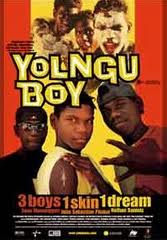
YOLNGU BOY
Australia, 2001, 87 minutes, Colour.
Sean Mungunggurr, John Sebastian Pilakui, Nathan Daniels.
Directed by Steven Johnson.
Yolgnu Boy was made under the auspices of the Yothu Yindi foundation in the Northern Territory and the Australian Children’s Film Foundation. It is filmed in beautiful territory, the Gove Peninsula, Arnhem Land coast. The three central children live on the coast but make their way through the rugged territory to Darwin.
The film takes up contemporary themes for aboriginal teenagers. However, it initially shows them in idyllic situations, young boys, swimming and fishing together, friends, and then undergoing their initiation rites. There is a transition to seeing them in their teenage years, one staying at home and keeping to the traditions, another keen on Australian rules football and wanting to get to Essendon, a third going to prison and being released.
The film shows the realities of 20th-21st-century living for teenagers, in the communities as well is in Darwin. The film does not shy away from portraying petrol sniffing, vandalising stores, the reality of prison. But it also advocates the initiation rites and the importance of these in the boys’ lives, in their transitions from childhood to adolescence, to the significance of the Dreaming, of the symbols, of the importance of the dancing and being in contact with the reality of the traditions.
The three boys portray the aborigines with conviction. They have some potential but are limited by their background, their treatment, conditions in the Northern Territory.
The film also shows the respect for the elders and their taking responsibility in trying to bring up the young men well. There is a glimpse of the Northern Territory police, a small cameo by Jack Thompson to give some cinema credibility to the film.
The film also shows how during the first years of the 21st century, indigenous filmmaking would develop both on screen and on television.
1. An Australian indigenous story? About children? For children? The aboriginal audience, aboriginal children, adults? Other Australians? International audiences?
2. Audience presuppositions, the Dreaming, aborigines and 20th-21st century life, the role of the traditions, in the modern world? Rituals, dancing, initiation ceremonies? Men’s business? The memories of initiation rites and their consequent effect? The 20th-century 21st-century world, modern music, commercialism, vandalism and stealing? Petrol sniffing? Sport? Prison life? The elders and their authority? The musical score?
3. The Northern Territory, its beauty, the Arnhem land coast, the towns and communities, Gove, the contrast with Darwin?
4. The introduction to the boys, the telling this story, their being introduced? The backgrounds, the young age, together, playing, swimming, fishing?
5. The time for initiation, the details of the ceremonies, the painting, the effect? The flashbacks to the ceremonies?
6. The boys in teenage, their lives, together, friendships? Differences? Lorrpu and his being at home? His leadership? Is memories? Millika and football, an easy life? Botz, his father, older, leadership? His sniffing the petrol and its effect? The vandalism and the exuberance of stealing? His carelessness with the fire, the burns, the injuries, hospital?
7. Botz, coming out, the injury to his arm, the danger for the police?
8. Lorrpu and his decision to go to Darwin, finding the boat, it capsizing, taking the radio and the modern music, the trip, the rowing, the stingray and its pulling the boat, seeing the turtle, capturing the turtle, the food? The difficulties, their clashes, the different visions for the future? Hopes? Hunting and painting, traversing the land?
9. The authorities, the white police, Jack Thompson in a cameo role? The aboriginal elders, the responsibilities, there guarantees, the search? The helicopter?
10. The young girl, flirting with Liverpool, leaving on the plane, the promise of the visit, his going to the school and her reaction?
11. Getting to Darwin, eating in the cafes, the clashes, new clothes, shopping? Botz going to find his father, his father not aware of his son, beating the
cigarette? Botz and his going to the wharf, sniffing the petrol, his death? The others finding him, the effect, grief? The elders and the funeral?
12. Aboriginal stories, the boys, their potential, conditions for life, favours and successes? The future?
Unorthodox
Episodes, from Wikipedia
1 "Part 1"
On a Sabbath day, 19-year-old Esty Shapiro, an ultra-Orthodox Jewish married woman, flees her home in the Williamsburg, Brooklyn, section of New York City with only a handful of possessions. She takes a plane to Berlin, where her estranged mother lives, but her mother is not at home when Esty arrives. At a coffee shop, Esty meets Robert, a young man ordering many coffees. She helps him take coffee to his friends who are waiting at a nearby music conservatory where they all study. Esty sneaks into their rehearsal, and is deeply moved by their music. After the rehearsal, she hears the group announce they are going to the beach, and asks to come along. At the beach, Esty removes her sheitel as she bathes in the water, revealing her hair.
Back in Williamsburg, Esty's husband, Yanky Shapiro, discovers she is missing, and runs to his family for help.
In a flashback, Esty prepares to marry Yanky, and is visited by her mother who gives her repatriation papers for Berlin, should she ever need them. Esty goes forward with her wedding.
2 "Part 2"
Esty is discovered sleeping overnight in the conservatory. She is encouraged to apply for a hardship scholarship given to talented refugees and musicians in other difficult circumstances. Esty decides to go forward as she plays the piano. When her conservatory friends invite her to dinner, they ask her to perform a piece. Esty is heartbroken when one of them, Yael, tells her that, while she is musical, her playing is merely adequate and nowhere near good enough for the conservatory.
Yanky and his cousin Moishe fly to Berlin to try to retrieve Esty, and Yanky is stunned by Moishe's wordly ways.
3 "Part 3"
Esty decides to withdraw her application for the conservatory, but the woman processing her application convinces her to continue with it. She goes to a club to see Yael performing, and is spotted by Moishe, who has succeeded in tracking her down. Esty leaves with Robert before Moishe can confront her.
In a flashback, Esty's marriage begins to crumble almost as soon as it starts as she cannot have sex with Yanky because she finds it painful. She is eventually told she is suffering from vaginismus. After a particularly angry fight with Yanky, Esty urges him to complete sex with her, despite her horrific pain.
4 "Part 4"
Moishe finally tracks down Esty, and threatens her, telling her she will have nothing if she doesn't return to her husband. In distress, Esty finally contacts her mother, who promises to support her and her child. Esty decides to go through with her audition, switching her discipline from the piano to voice. After her audition, she is approached by Yanky, who begs her to come home with him, and though Yanky has promised to change, Esty tells him it is too late for them and leaves to start her new life.
Howard's End/ 2017
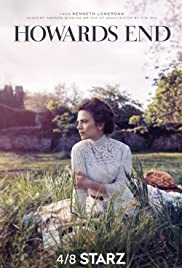
HOWARD'S END
UK, 2017, 4X 60 minutes, Colour.
Hayley Atwell, Matthew Mac Fadyen, Philippa Coulthard, Joseph Quinn, Joe Bannister, Alex Lawther, Jonah Hauer- King, Tracy Ullman, Julia Ormond.
Directed by Hettie Mac Donald.
From the novel by E.M.Forster. Comparisons can be made with the award-winning version by Merchant- Ivory, 1992.
A four-part television series, adapted by playwright, Kenneth Lonergan
From the Wikipidia entry: Episodes
1 "Episode 1"
After meeting the Wilcoxes on the Continent, Helen Schlegel visits them at Howards End. There, an unfortunate engagement between Helen and Paul Wilcox is quickly ended. The wealthy Wilcoxes decide that the Schlegels - elen, her older sister Margaret, and brother Tibby—are of the unreliable, idealistic sort. The Schlegels meet and become interested in Leonard Bast, a lower class clerk. While the rest of the Wilcox family are away, Margaret and Mrs. Wilcox meet and become close friends.
2 "Episode 2"
Mrs. Wilcox dies. After the funeral, the family discovers that Mrs. Wilcox, knowing the Schlegels must soon leave their home, has written a note bequeathing Howards End to Margaret. Henry Wilcox assumes his wife was not of sound mind and the children believe that the Schlegels maneuvered to obtain an inheritance. They destroy the note. Helen becomes more interested in helping Leonard Bast. Mr. Wilcox becomes interested in Margaret and she him.
3 "Episode 3"
Henry and Margaret plan their wedding to the dismay of the Wilcox children, especially the eldest son, Charles. Helen dislikes Henry and his business activities and strongly disapproves of the wedding. Based on advice Henry gave to Margaret and Helen, Leonard has left his job and then loses his new job. He and his wife are now destitute, something Helen strives to rectify.
4 "Episode 4"
Helen has mysteriously left for Germany and for months avoids contact with Margaret. She returns because their aunt's illness and the mystery of her departure is revealed. A confrontation at Howards End with Leonard, Henry's son Charles, and the Schlegel sisters ends in tragedy. Margaret nobly resolves the ensuing conflict.
Production
1. The adaptation of E.M.Forster? His reputation? The beginning of the 20th century? This television adaptation?
2. The early 20th century, England, transition, from carriages to cars, fashions, the suffragettes, business and empire, expansion?
3. Howard’s end, the house, the grounds, the interiors? The London settings, the streets, homes, the contrasts? Concerts? The range of costumes, decor, musical score?
4. The Schlegel sisters, Tibby? The father, money? Margaret and her care? The effect, children? The German connection? The Wilcoxes, social, the house and change?
5. The Wilcoxes, patriarchal traditions, wealth, business, African connections? The issues? The boys, the exercise? The girls and calisthenics? Henry, control? The quiet wife? Helen, present, the letters, the explanations? Paul, the crisis in change?
6. Mrs Wilcox, the friendship with Margaret, leaving the house to the sisters? Henry’s reaction, hostility, the reaction of his children? Charles and his dominance?
7. Margaret, the encounters with Henry, her helping Leonard, the bond with Henry and the proposal?
8. Leonard Bassett, his background, age and experience, family life? The concert, the umbrella? The meeting with Margaret, his reactions, her care? His job, his marrying? Home life? Losing his job? Desperation, dependence on Margaret?
9. The aunt, talk, judging, the visit, recurring?
10. Helen and Margaret, death, the consequences? Leonard Bast, the concert, the umbrella, his visit, the card, the effect, the family, criticisms, the brother? Jackie and the relationship? The marriage? Job, advice, visiting the house, Jackie’s visit? The effect of the sisters? The visits, the walks? Helen and Margaret, Helen helping, to be in the check? The books? Helen and her pregnancy? Violence and death?
11. Margaret, Henry, the meetings, difficulties, the talk, the funeral? The proposal, reactions? Leonard Bast, the house?